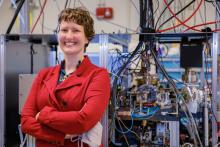At Sandia National Laboratories, QSCOUT (the Quantum Scientific Computing Open User Testbed) is an open quantum computing testbed based on Yb-171 trapped ions. Distinct from most commercial platforms, we offer users flexible and transparent control over the qubits as well as the ability to craft gates at the fundamental pulse level. To do this, we use our custom-developed programming language Jaqal (Just Another Quantum Assembly Language), consisting of a package of schedulable native operations that includes the full parameterization of single qubit rotation gates and the two-qubit Mølmer-Sørensen (MS) gate. Here, I will discuss how we employ both the QSCOUT hardware and the Jaqal software to offer users unique low-level access to the experiment for their quantum computing applications. I'll present current capabilities offered on the system as well as future integrations and developments.
Bio: Susan Clark joined Sandia National Laboratories as a postdoc in 2013 and was promoted to technical staff in 2014. Since then, she has worked on a variety of quantum information related projects involving trapped ions and gate defined quantum dots in Silicon. She is currently the PI of the DOE Office of Science ASCR funded program QSCOUT (Quantum Scientific Computing Open User Testbed) which began user experiments early last year. Prior to Sandia, she worked for Chris Monroe at University of Maryland and the Joint Quantum Institute as a postdoc demonstrating protocols for combining remote and local entanglement for building scalable quantum systems based on trapped ions. She earned her PhD from Stanford University under Yoshi Yamamoto, examining
ultrafast, optical techniques for quantum manipulation of neutral donors in GaAs and ZnSe. During undergraduate study at Duke University, she developed an all-optical transistor based on a rubidium atom cloud.
